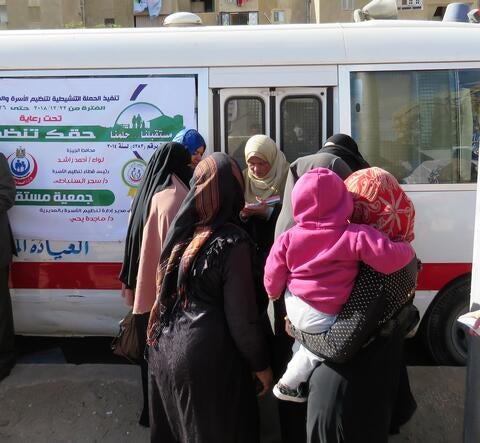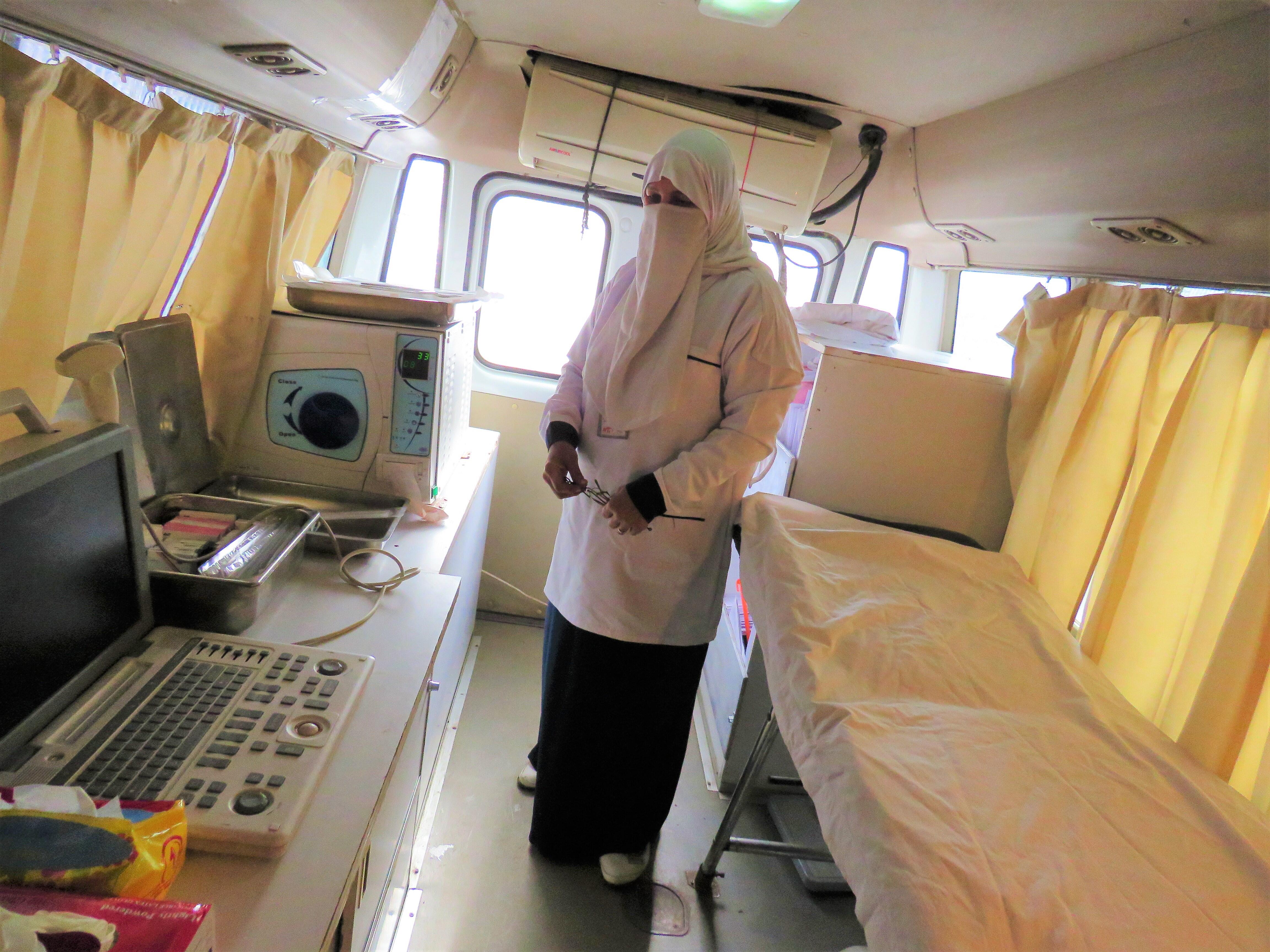Saynaa Shafei was visiting her mother in Giza when she took her by the hand and brought her to a mobile clinic that offers free family planning services. The 23-year-old who was visiting from Fayoum has two children and wants to “take a break.”
“She has two children already, she needs to rest for a while,” her mother, 42-year-old Sanaa says. “She was on contraceptive pills but she used to forget to take them, that’s why I want her to insert an IUD.”
Saynaa was married at 18 years old and became pregnant with her first child Hamza at 20. She was admittedly using contraceptive pills irregularly after her first born, and therefore became pregnant with her second child shortly after. Her sons are two years apart – the youngest of whom is one year and four months old.
“I had my children one right after the other,” she says, “my first pregnancy was also rough and I had to have Hemorrhoids surgery when I was eight months along … I need a break.”
She recalls that Hamza was too young when she had her second born, Mazen. “It was unfair to both him and I … he was always crying and jealous, and he was always clinging on to me.”
Although Saynaa acknowledges she needs to use another form of contraception other than the pill, she was reluctant to insert an IUD.
“I would’ve never come here on my own, I needed some encouragement,” she says, “I am scared of inserting an IUD.”
While Saynaa and her husband did not agree on the number of children they want, they are in agreement that Hamza and Mazen are enough for now. She explains that it is not necessarily the financial constraints that are affecting their decision.
“My husband sees that I am exhausted and he told me to take a break,” she explains.
Saynaa believes that the spacing between each child should be around three years. “If they’re closer than that you won’t be able to handle them,” she says.
Her mother on the other hand, believes in wider spacing between children. Her three daughters are four and six years apart respectively.
“I waited until I sent my first born to school before I thought about having another baby,” she explains, “this is how it should be; you should wait until your child goes to school before you have another one.”
For Sanaa, family planning is essential. “At the very least to put an end to this overpopulation that we see,” she says.

The mobile clinic, parked in the Giza district of 6th of October, is part of a nationwide campaign launched in December by UNFPA in partnership with the Ministry of Health and Population's Family Planning Sector, and with the support of the European Union in Egypt.
The 10-day campaign, dubbed “Your Right to Plan,” was implemented in the governorates of Gharbeya, Sharqeya, Giza, Minya, Daqahleya and Qena and offered free family planning and reproductive health services, including free medication through fixed and mobile clinics, public and central hospitals, and maternal and child health centers.
According to data from the Ministry of Health and Population's Family Planning Sector, the campaign reached 282,550 beneficiaries across the six governorates, offering clinical services ranging from consultations to dispensing contraceptives such as IUDs, condoms and pills.
This comes as part of UNFPA’s Country Programme (2018-2022) which aims to scale up family planning programs in Egypt. Fertility rates currently stand at 3.5 percent and the percentage of currently married women using modern contraceptives is at 56.9 percent.
The unmet need for family planning also increased from 11.6 percent in 2008 to 12.6 percent in 2014.
According to UNFPA’s State of World Population 2018 report, having the information, the power and the means to freely decide the number, timing and spacing of pregnancies is a human right, which ultimately enables the social and economic development of countries.
Empowering couples in countries with large and emerging youth populations, such as Egypt, to realize their desires for fewer children or to have children later in life can lead to a demographic shift that can result in a demographic dividend, which can fuel economies and reduce poverty
Inside the mobile clinic, Dr. Amany el-Sayyad displays a basket containing contraceptives, including an IUD, a blister pack of pills, contraceptive injections and a condom.
“A first-timer can come in not knowing what an IUD looks like, so I show it to her,” she explains.
She says however that women have made strides over the past 10 years in terms of the level of awareness on family planning.
“I have been working in family planning for the past 11 years, there were a lot of misconceptions about contraception that are no longer there,” she explains, “women used to think that IUDs and contraceptive injections would make them sterile, they would also worry about contraceptive pills giving them cancer.”
Dr. Amany explains that religious and cultural beliefs pertaining to family planning have also changed, explaining that people now make the distinction between “birth control” and a rights-based approach to family planning.
“I am not telling you how many children to have,” she says, “I am only talking to you about the spacing and timing of children.”
“Give yourself a break, give your child a break, give your husband a break and give the state a break,” she says.
Dr. Amany explains that 90 percent of women who come in already know what kind of contraceptive they want to use.
“I have women telling me that they attended a seminar for example and learned what the most suitable method for them is,” she recalls, “that makes me very happy.”
Other women, Dr. Amany says, come in with a lot of information they gathered from their mothers, sisters or mothers in law.
“But when I start to debunk the misconceptions they come in with, they listen to me,” she says, “when they hear information from a medical professional, they take it to heart.”
Inside the mobile clinic, Nora sits holding her baby, waiting for Dr. Amany to dispense contraceptive pills for her.
“You can take these for six months because you are breastfeeding,” Dr. Amany explains, “you can come back after and we can talk about another form of contraception until you decide to have another baby … but take your time.”
“It’s not the time at all,” Nora laughs, “I will definitely take my time.” 


